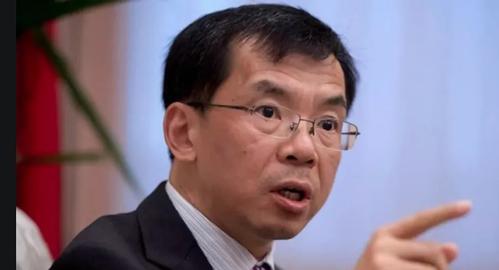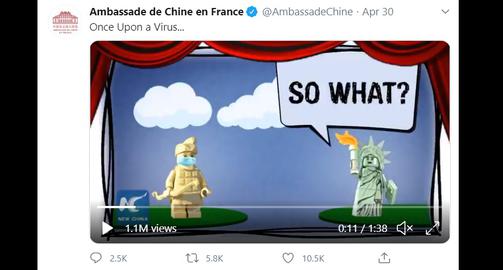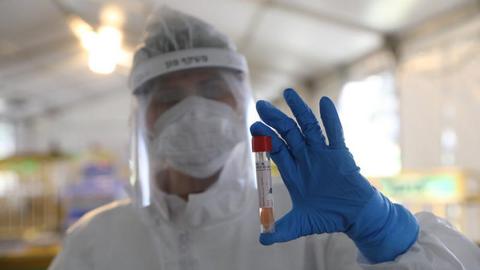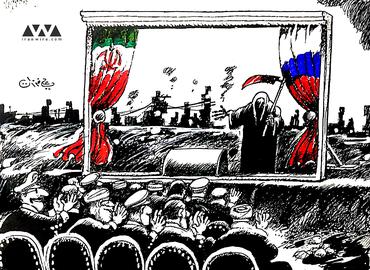Jianli Yang, a mathematician and human rights activist, survived China's Tiananmen Massacre in 1989, after which he left China for the United States. He returned in 2002 and was jailed between 2002 and 2007 for supporting the country's labor movement. He was intermittently held in solitary confinement for a total of 15 months – as detailed in a previous IranWire interview – and returned to the US after his release.
In a new weekly series for IranWire, Jianli Yang analyses Chinese disinformation around the origin of coronavirus and its handling to date.
On April 14, Lu Shaye, the Chinese Ambassador to France, was summoned by the French Foreign Minister to convey France’s “disapproval” over his embassy’s recent comments related to the spread of coronavirus.
According to a public statement issued by the Foreign Minister on the issue, the Chinese embassy website had carried a series of articles, also circulated through its social media accounts, that alleged Western governments including France had reacted slowly to the pandemic and were wrongly blaming China for the outbreak.
Some of the articles, which were published between March 22 and April 12, accused Europe of racism. The articles added that staff in French nursing homes had abandoned their posts, indicating a failure of the French government to control the situation. They also challenged recent news reports that blamed China for providing allegedly defective medical equipment to other countries, including test kits to Spain, and accused the recipients of not using them correctly. Between April 1 and April 8, the Chinese embassy spokesperson had also issued three separate statements criticizing French newspapers for their reporting on China with regard to Covid-19.
Similar battles have been playing out in headlines and public statements across Europe. In Germany, the editor of the tabloid newspaper Bild called on China to pay compensation for economic damage caused by the pandemic. The Chinese embassy in Berlin published a rebuttal, prompting the newspaper to publish a further stinging response. In the Netherlands, the Chinese embassy has accused the local newspaper Volkskrant of publishing “far-fetched and malicious” stories targeting China. And the Chinese ambassador to Cyprus, Huang Xingyuan, also claimed the international community was embarrassed by how quickly China had resolved its domestic outbreak and had therefore resorted to “blame shifting and lies.”
In the United Kingdom, however, Chinese ambassador Li Xiaoming seems to be adopting a more cautious stance. Although he has previously held press conferences to denounce alleged British media criticism of China’s handling of the Hong Kong protests, and the embassy website carries his letters to the British authorities in which he questioned their alleged “anti-China” bias, the ambassador has refrained from criticising the UK’s own response to the outbreak.
The German Marshall Fund, a US non-partisan think-tank, has observed that activity on the Twitter accounts of Chinese embassies, consulates and ambassadors has increased by more than 250 percent since the beginning of the Hong Kong protests in March 2019. From September to December 2019, the Chinese diplomatic corps created more than 40 new Twitter accounts; double the total that was under its purview before April 2019.
Most Chinese embassy channels have now actively defended China’s handling of the pandemic and detailed its generosity in supplying protective equipment to other countries around the world. From time to time, they have also promoted conspiracy theories about the source of the outbreak.
This is apparently part of a new “fighting spirit” that was demanded of China’s diplomats in a memo sent last year by President Xi Jinping. But others have not taken well to this; in April, Brazil’s Education Minister accused China of planning “world domination,” while the Twitter account of the Chinese embassy in Sri Lanka was briefly suspended for “inflammatory” posts. China’s new assertiveness marks a break not only from traditional diplomacy, but from the country’s avowed policy of non-interference in the affairs of other states.
Also in this series:
China's Campaign to Protect President Xi against Coronavirus Criticism
Putin’s Domestic Problems Eclipse Russian Disinformation Campaigns
Missing Data, Mud-Slinging and “Miracle Cures”: Why Disinformation Is Bad For Your Health
Iranian Online Network Still Peddling Coronavirus Disinformation
visit the accountability section
In this section of Iran Wire, you can contact the officials and launch your campaign for various problems



























comments